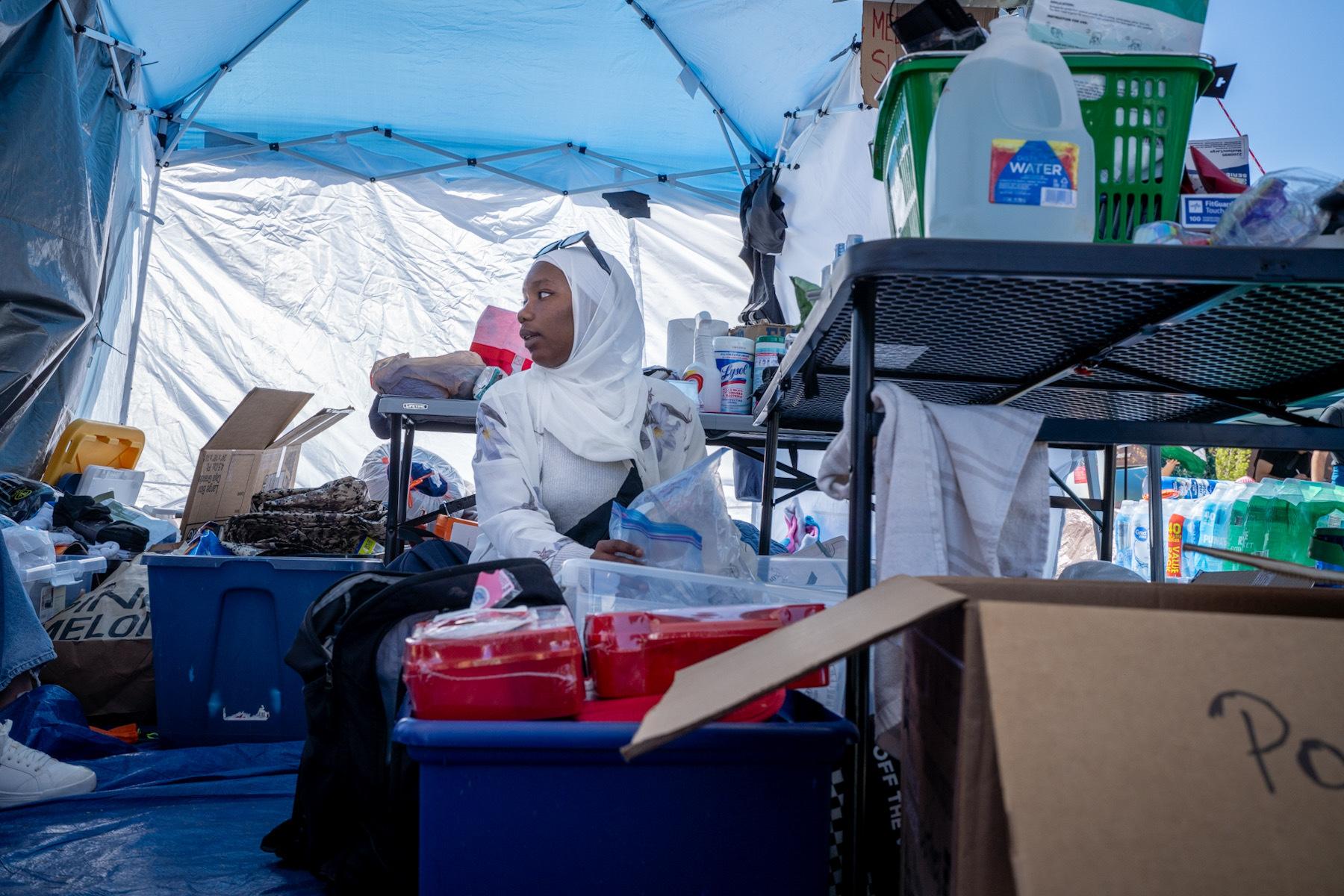As students from the University of Colorado Denver, Metropolitan State of Denver and Community College of Denver work through their final week of classes before graduation, dozens are still in tents on the Auraria campus’s Tivoli Quad.
It’s been nearly two weeks since protestors set up camp to protest the Israeli government’s war in Gaza. More than 40 people — half of them students — have been arrested and released since then, not including 14 protesters cited Tuesday for trespassing.
Wind, snow and hail storms have battered the huddled polyester huts. Protests at universities in other states have turned violent, drawing condemnation from political leaders on both ends of the ideological spectrum.
Still, the group in Denver says it’s here to stay. The campers’ current demands include statements from the universities denouncing Israel’s actions in Gaza and divestment from any companies doing business in the country.
For some activists, the current antiwar camp is reminiscent of a scene that unfolded nearly two decades ago.
What the camp and protests looked like in 2003
In March 2003, a group of Auraria students set up what was described as a “tent city” around the campus's flagpole, an act of protest highlighted by Metropolitan State University of Denver on its history page.
Archival material in the Denver Public Library’s Western History Collection describes an eight-tent camp occupied by over a dozen protesters who handed out anti-war literature and promised to stay put until the Iraq War ended.
“We support our troops. Many are our age. We feel bad they have to be there," then-22-year-old philosophy student Theresa Willis told The Denver Post. "But I see this war as a failure by the U.S. government at being diplomatic and a world player and instead going against the United Nations."
Martin Chase, who was enrolled in a simultaneous undergraduate and masters program at CU Denver and MSU Denver in 2003, said the camp manifested spontaneously. He didn’t believe the Bush administration’s claim that Iraq had weapons of mass destruction.
“I was working a job, I was working a night shift at a restaurant, and I was going to school during the day. And so where was there time to protest?” Chase told Denverite. “We just started doing it all of our free time, and so we had to have tents, and so we just sort of stayed there and put up signs and in between classes came down and yelled for however long we had.”
The 2003 camp was preceded by months of antiwar demonstrations across Denver. In January, 19 protesters were arrested downtown after marching from Auraria to a Halliburton facility, where they blocked entrances to protest the use of fossil fuels in weapons.
In March 2003, a group of about 3,000 people — mostly women — marched from Auraria to Civic Center Park to protest the war’s impact on children.
In addition to protesting the Iraq War, students also erected signs protesting Israeli violence against Palestinians and Chinese violence in Tibet.
But unlike today’s antiwar camp, the 2003 protesters obtained a permit from the campus to set up their encampment.
“The administration was great,” Chase said. “We used the showers. The campus security would come walk by every now and then and chat with us. Our teachers were curious. They each had their own stance on the war. It wasn't a united front of teachers in that regard, but they weren't yelling at us about being on campus or anything.”
Chase doesn’t recall how the camp ended. He left it before it reached its conclusion because he was starting to fail his classes. Reporting at the time said the encampment was torn down after about three weeks to make room for a campus event, according to the now-defunct Rocky Mountain News.
About a year later, Auraria officials enacted an anti-camping policy, banning the use of overnight tents on campus grounds.
When asked about the camping ban, Auraria Higher Education Center CEO Colleen Walker said she wasn’t sure why the policy was enacted in the first place. She did not address whether the timing may have been related to the Iraq War protests.
“We've enforced the camping ban for 20 years, and it is to keep the campus environment safe and secure,” she said.
But longtime local activist Z Williams, who says they participated in Auraria’s 2003 Iraq War protests, said the timing of the camping ban’s introduction wasn’t a coincidence.
“This is very specifically an anti-protest policy,” Williams said, adding that students now are much more organized than their predecessors. “I'm very confident that these student leaders will continue to find ways to apply pressure to the campuses and to keep this movement growing.”
Chase no longer lives in Denver, but he’s read headlines about student protests across the country. He said students today face more hostility and violence than his generation.
“I was protesting 20 years ago and engaging with the campus and it felt healthy, and now it just feels so dysfunctional and there's some sort of authoritarian bent to what's going on,” he said.
What's next for students camping today?
Auraria officials said its three campuses are united in a commitment to students’ free speech, but have also maintained that students are continually in violation of the anti-camping policy.
Lucia Feast, a student organizer in the current camp, said they weren’t aware of the history when they erected the encampment. However, the longer they’ve been entrenched on the quad, the more they’ve learned about their predecessors.
“We talked to people who have gone through these things, done these forms of protests before, we're really wanting to learn as much as we can and grow from them as possible,” Feast said.
Feast and other student protesters said they’re hoping to keep the camp going longer than their 2003 predecessors. She knows the camp will soon face significant challenges, though, as summer break and a familiar wave of campus events approach.











